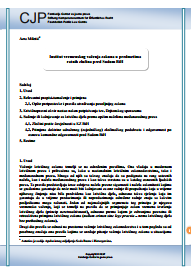Institut vremenskog važenja zakona u predmetima ratnih zločina pred Sudom BiH
Time Validity of Law Term in War Crimes cases before the Court of BiH
Author(s): Azra Miletić
Subject(s): Law, Constitution, Jurisprudence, Constitutional Law, Criminal Law, Public Law
Published by: Fondacija Centar za javno pravo
Keywords: Public law; constitution; Constitutional Court; criminal law; war crimes; BiH; Court of BiH; legal framework;
Summary/Abstract: When it comes to Bosnia and Herzegovina, the applicability of the Criminal Code may be characterized as a first-class legal issue, particularly as regards war crimes and other cases of gravest breaches of international humanitarian law currently being prosecuted. It has been in the focus of interest of not only the legal community, primarily because two quite different regimes or approaches to the application of criminal codes in such cases have been on the scene, depending on whether a criminal case is prosecuted by the Entities’ judiciary or the Court of BiH. As to the comparison between codes, sometimes several codes, two principles on which it is based should be taken into account: the principle of concreteness and the principle of alternativity. Both principles are sometimes differently perceived in theory. In addition, different approaches and even inconsistencies in their application exist in the case-law. In this respect, one should particularly bear in mind that the aforementioned comparison seeks, in fact, to identify a code more lenient to the perpetrator, that is, to the case at issue, and sometimes it can be the code prescribing a more stringent punishment for the relevant criminal offense. At the time when the Dayton Peace Agreement was signed, BiH was not a signatory state to the Second Optional Protocol to the International Covenant on the Civil and Political Rights at the international level as prescribed by the Optional Protocol II, and was not obliged to make reservations to the Protocol. Therefore, Article 2 of the Optional Protocol II constituted no obstacle to the existence of death penalty in the BiH legislation during the period from the signing of the Dayton Peace Agreement until the adoption of new criminal legislation. In general, Article 2 of the Second Optional Protocol prescribes that each member state shall be obliged to take necessary measures to abolish the death penalty within its jurisdiction. This was done by the adoption of the Criminal Code of the Federation of BiH (1998), the Criminal Code of Republika Srpska (2000) and the Criminal Code of Brčko District (2001), when the death penalty was abolished, or more precisely, removed from the criminal legislation in Bosnia and Herzegovina. Article 4a) of the CC BiH, which is identical to Article 7(2) of the ECHR, provides for an exceptional deviation from the principle set forth in Articles 3 and 4 of the same Code. It also provides for trial and punishment for acts constituting criminal offenses pursuant to international law, or violations of the prohibition-type norms and rules that are generally supported by all nations, that are of general importance, or considered to be or to represent universal civilization achievements of the contemporary criminal law, where such acts are not prescribed as criminal under national legislation. Article 4a) of the CC of BiH addresses not only trial for these criminal offenses, but their punishment, too, because if an offense has not been prescribed, then the sanction thereof has not been prescribed either. Furthermore, it is impossible to apply one code to the qualification of the offense, and another one to the criminal sanction, that is, a combination of codes. Therefore, punishment of war crimes perpetrators in application of the referenced provision has not been conditioned with the application of Articles 3 and 4 of the Criminal Code of BiH. This provision also applies in trials of cases qualified as Crimes against Humanity, as stipulated under Article 172 of the CC of BiH. The application of the referenced Article, however, also ensures to the full extent trials based on joint criminal enterprise and command responsibility. The CC of SFRY did not explicitly stipulate these forms of participation and responsibility. They however, do fall under customary international law and treaty law as now stipulated in Article 180 of the CC of BiH.
Series: CENTAR za JAVNO PRAVO — Analize
- Page Count: 19
- Publication Year: 2012
- Language: Bosnian
- Content File-PDF
- Introduction

